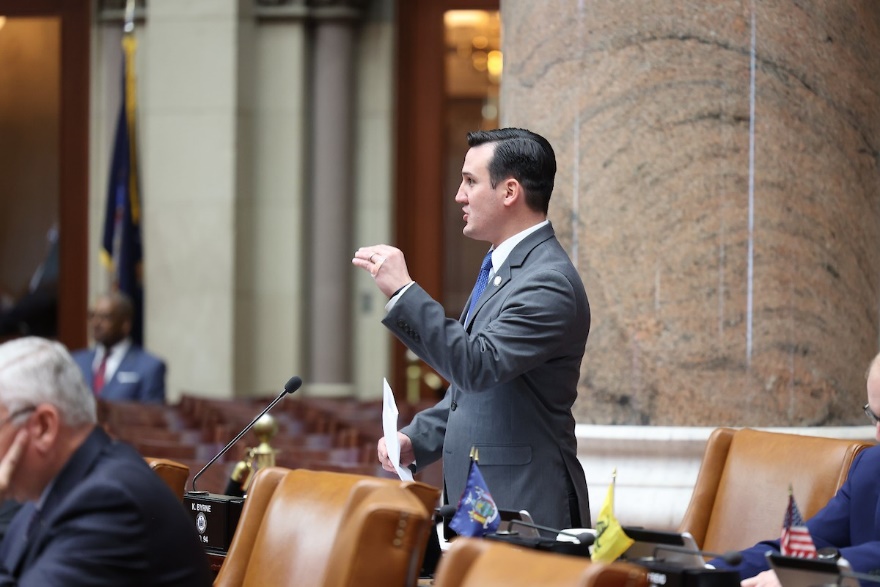
After another marathon budget week in Albany, the Assembly, Senate and Gov. Hochul finally came to an agreement and finished the state’s 2022-23 budget. Due at midnight on Friday, April 1, the complete budget was not passed until approximately 9:30am on Saturday, April 9th. Any private sector job or business loses when it fails to meet basic deadlines, but not for the leaders of our state.
Sadly, but not surprisingly, the budget process remains a broken mess. Nevertheless, I am pleased that several of the initiatives we fought for were included in the final product:
- $4 billion in tax cuts for middle class families (lower-income tax rate for married filers under $323,200, head-of-household filers under $269,300, and single filers under $215,400).
- Temporary suspension of the state tax on gasoline and diesel (June 1st, 2022 – December 31st, 2022).
- No new tax increases to income (however, the state still does rely on an overall tax structure that depends on a disproportionate taxation of high-income earners).
- $2.2 billion homeowner tax rebate check program.
- EMS Cost Recovery legislation enabling volunteer departments who provide ambulance services to recover cost for services from insurance providers.
The budget also included important funding to support local libraries, the Joseph P. Dwyer Vet to Vet programs in Westchester & Putnam counties, and continued state-aid to support infrastructure programs like CHIPS (Consolidated Local Street and Highway Improvement Program), EWR (Extreme Winter Recovery Program), and PAVE-NY which better enable county and local governments to maintain their local roads. These specific programs provide crucial services locally and are good quality investments that New Yorker’s expect from their state government.
Like every New York State budget negotiation I have been a part of, there were far too many misguided issues and initiatives included in our massive budget, which was a 3.5% increase from last year’ budget, and a $45 billion or 25% increase from the 2019/2020 state budget. Some of the more egregious examples included:
- Overall spending surpassed $220 billion, which positions NYS closer to California and busts the administration’s self-imposed spending cap.
- Minimum payment on our debt, setting us up for financial hardship in future years
- $600 million in taxpayer money to the Buffalo Bills for a new stadium that College of Holy Cross sports economist Victor Matheson called, “one of the worst stadium deals in recent memory.”
- Picks more winners and losers with hundreds of millions of dollars from taxpayers and credits for special interests.
- Spends more money on implementation of public financing of campaigns, aka “welfare for politicians.”
- Continues to rely on a variety of broken policies which keep New York ranked with the worst economic outlook of any state in the country (2022, Rich State. Poor States).
To no one’s surprise, the budget fell woefully short in correcting multiple facets of our criminal justice system. While the budget did restore a judge’s ability to set bail for people charged with specific new crimes after being issued a desk appearance ticket prior to arraignment, it remains very limited. The budget’s artificial bail reform claw-back did not allow judges to consider public safety risk when determining pre-trial release (A5265), it did not allow judges to fix bail for most felonies and misdemeanors, and it left numerous criminal offenses involving gun possession as ineligible for bail (A7066). It also did nothing to address privacy concerns during the discovery process for emergency services’ personnel (A4949). Sadly, but not surprising, many of the same political power brokers that created bail reform back in 2019 refused to make meaningful changes that would empower judges and prosecutors to make our state safer.
In the end, I voted in favor of budget bills A9005-C and A9009-C, as they were cleaner and more concise pieces of legislation that I support. These bills included provisions that cut taxes, suspended the state sales tax on gasoline for the remainder of the year, fully funds local aid to local municipalities (AIM) with state dollars – not county sales tax revenue, added a new rebate program for property taxpayers, and included the EMS Cost Recovery legislation I’ve advocated for since I first joined the Assembly. I opposed much of the excessive and inappropriate spending included in other omnibus budget bills (A9002, A9003-D, A9004-D, A9006-C, A9007-C, A9000-E, A9008-C, A9001-A).
Looking ahead, hopefully with fresh leadership at the helm, it is my sincere hope that our state will make the changes needed to become stronger, safer and more affordable. Till then, I remain your committed public servant and will continue to advocate for the type of affordable, accountable, limited government we all deserve.
The above information was previously distributed and made public for immediate release by the Office of Assemblyman Kevin Byrne
